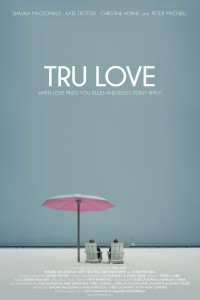As much as technology has progressed and storytelling has creatively evolved, the film industry still remains on a playing field where movie goers – all too easily – can look at a project and label it as something that’s either for males or for females. Of course, there are exceptions, but this sort of divvying haplessly exists.
Moviemaking thankfully advances as films open themselves for its audience to overlap. When I sat down to interview Corner Gas’ Gabrielle Miller about her female empowered flick Down River, she put everything in perspective. She explained that even though a movie may be looked at as a female vehicle, it’s still – above all – a human story.
What I’ve noticed with films that hold a predominant female cast comes a certain breed of grace. Down River certainly had that form of sensitivity to it, and I think Ms. Miller would agree with me. It’s the same gentleness that Tru Love embodies. A certain calmness that helps the film find its legs and earn steady momentum, leading Tru Love to its salvation.
Kate Johnston and co-star Shauna MacDonald have constructed a movie with a romantic premise some would call taboo – although, it’s not entirely scandalous. It requires a humbling matureness from its audience to match the attitudes of those involved with the production. An attitude that’s consistent in Canadian indies that always manages to find a way to be fresh.
Tru (played by MacDonald) is unable to maintain a relationship. She could have the willpower if only she showed the necessary compassion. Through her bestie Suzanne, she meets the friend’s mother Alice (played by Kate Trotter). Alice, a mourning widow uninterested in shutting herself indoors, feels energized upon meeting Tru. She has all sorts of questions and inquiries about Tru’s interest in women and gets a kick out of the LGBTQ community. And, not in a way where the filmmakers milk any fish-out-of-water situational humour.
The two warm up to each other, but Suzanne (played by Christine Horne) is weirded out, and treats the budding chemistry as a charade. She knows Tru can’t stay committed, and she doesn’t want her mother getting hurt (who she sees as slightly delirious for establishing such a random friendship).
Tru Love treats the subject matter with delicate innocence. With one wrong tonal shift, Johnston and MacDonald could’ve had a wild misfire like Adore on their hands, cueing them to start blaming each other for the unexpected camp. But, with their combined sophistication and thoughtfulness, they make the chemistry between Tru and Alice lovely, and the frustration steaming out of Suzanne truthful in her resentment.
However, Tru Love isn’t without moments that challenge every daytime soap opera in terms of melodramatic readings and reactions. For instance, I felt scenes between Alice and her deceased husband Richard (played by Peter MacNeill trying his best) never quite took off. They feel shoehorned into a movie that already has its fill of virtue among an appropriate amount of people. The same goes for that superfluous hail mary of an ending.
But even when the film is combusting with mush, movie goers still find enough affection in Tru Love to be touched through its esteemed sentimentality. It’s a film everyone – men and women – can enjoy and talk about afterwards.





Leave a comment